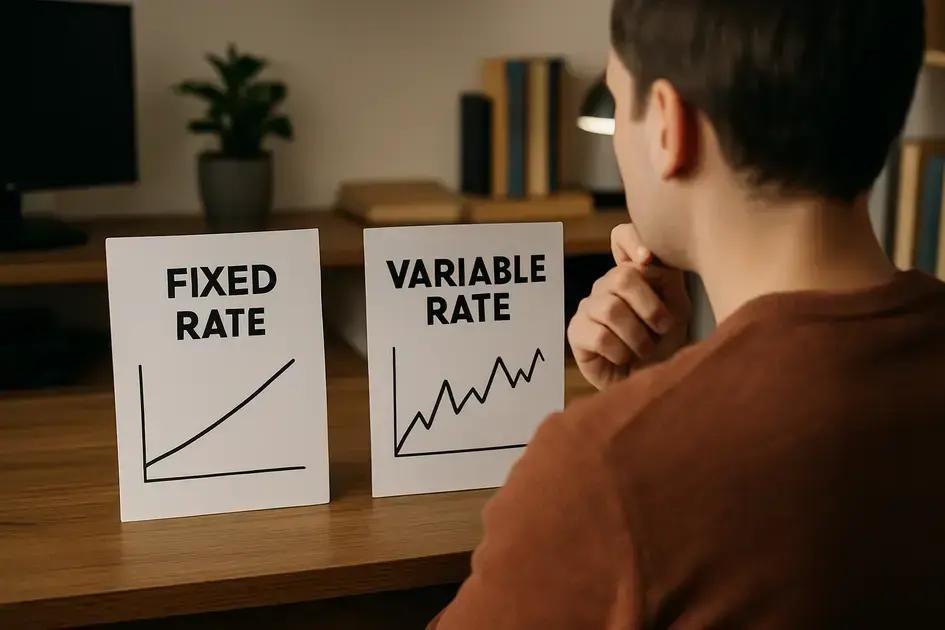Mortgage rates are the interest percentages charged by lenders on home loans, influenced by factors like inflation, credit scores, and economic conditions, and they directly affect your monthly payments and overall borrowing costs.
Mortgage rates have a way of making homeowners and buyers pause. Have you ever wondered why they fluctuate and what that means for your loan? Understanding these ups and downs can really change how you plan your finances.
What are mortgage rates and how do they work
Mortgage rates are the interest percentages lenders charge when you borrow money to buy a home. They determine how much extra you pay on top of the loan amount throughout the life of your mortgage. These rates can be fixed or variable and usually depend on several factors like the economy, government policies, and your financial profile.
When you take out a mortgage, the rate influences your monthly payment directly. For example, a lower mortgage rate means less interest added to your principal loan amount, making your payments smaller. Conversely, higher rates increase your cost.
How mortgage rates are set
Mortgage rates are influenced by the bond market, especially the yield on 10-year Treasury bonds. When these yields go up, mortgage rates tend to rise as well. Lenders use these benchmarks along with their costs, profit margins, and risk assessments to set the final interest rates they offer to borrowers.
Types of mortgage rates
Fixed rates stay the same over the entire loan term, offering stability and predictability. On the other hand, variable or adjustable rates change periodically based on market indices, which can mean lower initial rates but potential increases later.
Understanding what mortgage rates are and how they work is key to making smart home financing decisions. They impact your affordability, monthly budget, and long-term financial planning.
Factors influencing changes in mortgage rates
Mortgage rates fluctuate due to a variety of economic and financial factors that affect lenders’ costs and risks. One of the main drivers is inflation: when inflation rises, lenders demand higher rates to keep up with the decreasing value of money over time.
How the economy affects mortgage rates
Strong economic growth often leads to higher mortgage rates because demand for loans and credit increases. Conversely, during slowdowns or recessions, rates tend to fall as central banks lower interest rates to stimulate borrowing and spending.
The role of central banks and government policy
Central banks set benchmark interest rates that influence mortgage rates indirectly. For example, when a central bank raises its key rates to control inflation, mortgage rates usually rise as well. Government policies, including fiscal stimulus or housing market regulations, also impact rates by affecting supply and demand dynamics.
Market demand and investor behavior
Mortgage rates are tied closely to the bond market, especially the yields on government bonds. When investors buy more bonds, yields drop, which often lowers mortgage rates. Market sentiment and expectations about future economic conditions can therefore push rates up or down.
Borrower-specific factors
Lenders consider individual borrower risks when setting mortgage rates. A higher credit score, stable income, and a larger down payment often qualify you for better rates. This means personal finance management can influence the mortgage cost.
Understanding these factors influencing mortgage rates helps borrowers time their applications better and make informed decisions about their home financing.
Impact of mortgage rates on monthly payments

Your monthly mortgage payment is greatly affected by the mortgage rate you secure. This rate determines the interest amount you pay on top of the principal loan balance, directly influencing how much you owe each month.
Breaking down your monthly payment
Typically, your monthly payment includes principal and interest. The principal is the amount you borrowed, and the interest is the cost of borrowing that money. Higher mortgage rates increase the interest portion, causing your monthly bills to rise.
Example of rate impact
For example, on a $200,000 loan, a 3% mortgage rate may result in a monthly payment of approximately $843. Increase the rate to 4%, and your payment jumps to about $955. Even a small change can significantly affect your budget.
Other factors in your mortgage payment
Besides principal and interest, your payment might include property taxes, homeowners insurance, and possibly private mortgage insurance (PMI). While mortgage rates influence the loan portion, these other costs also affect your total monthly obligation.
Understanding how mortgage rates impact monthly payments helps you choose the right loan and plan your finances carefully.
How inflation affects mortgage rates
Inflation plays a crucial role in determining mortgage rates. When inflation rises, the value of money drops over time, which means lenders want to charge higher interest rates to compensate for that loss.
The connection between inflation and mortgage rates
Mortgage rates often move in tandem with inflation because lenders look to protect their earnings. If prices for goods and services rise, lenders expect more return on their loans to keep up with increasing costs.
Central bank response to inflation
To manage inflation, central banks may increase their key interest rates. This action makes borrowing more expensive across the economy, leading to higher mortgage rates. Borrowers might feel the impact quickly as new loan offers carry increased costs.
Long-term effects of inflation on homebuyers
Persistent inflation can make monthly payments harder to manage if rates climb significantly. On the other hand, borrowers with fixed-rate mortgages can benefit since their payments stay the same despite rising inflation.
Understanding how inflation affects mortgage rates helps homebuyers anticipate changes and plan their finances accordingly.
The role of credit scores in mortgage rates
Your credit score plays a significant role in determining the mortgage rates you are offered. It reflects your financial trustworthiness and helps lenders evaluate the risk of lending to you.
How credit scores affect mortgage rates
Higher credit scores usually qualify you for lower mortgage rates. This is because lenders see you as less likely to default on the loan. On the other hand, lower scores can lead to higher rates or even difficulty getting approved.
Factors influencing credit scores
Your credit score is based on several factors including payment history, credit utilization, length of credit history, types of credit used, and recent credit inquiries. Maintaining on-time payments and low balances helps increase your score.
Improving your credit score before applying
Simple steps like paying bills promptly, reducing outstanding debts, and avoiding new credit applications can boost your score. A better score can save you thousands of dollars over the life of your mortgage through lower interest costs.
Understanding the connection between credit scores and mortgage rates empowers you to prepare financially and secure the best possible home loan deal.
Fixed vs. variable mortgage rates explained

Mortgage rates come in two main types: fixed and variable (or adjustable). Knowing the difference helps you decide which loan best fits your financial situation and goals.
Fixed mortgage rates
A fixed mortgage rate stays the same throughout the entire loan term. This means your monthly payment is predictable and won’t change, even if market rates rise. It offers stability and makes budgeting easier, especially for long-term planning.
Variable mortgage rates
Variable rates can change over time based on market conditions. They often start lower than fixed rates, giving borrowers some initial savings. However, these rates can increase or decrease, affecting your monthly payment. The adjustment period varies, such as every year or every few years, depending on the loan terms.
Choosing between fixed and variable rates
If you prefer certainty and want to avoid surprises, a fixed rate is safer. If you expect rates to stay low or plan to sell or refinance before rates rise, a variable rate might save money initially.
Understanding the pros and cons of fixed vs. variable mortgage rates is key to selecting the right mortgage plan for your needs.
Refinancing: when to consider it with current rates
Refinancing means replacing your current mortgage with a new one, usually to take advantage of better interest rates or loan terms. It can lower your monthly payments or help you pay off your mortgage faster.
When to consider refinancing
If current mortgage rates are significantly lower than your existing rate, refinancing might save you money. A common rule of thumb is to refinance when rates drop by at least 0.5% to 1% compared to your original loan.
Other reasons to refinance
Besides lowering your rate, you may want to refinance to switch from an adjustable-rate mortgage to a fixed-rate for more stability. Refinancing can also help you tap into home equity to fund major expenses or consolidate debt.
Costs and considerations
Refinancing comes with closing costs and fees, so it’s important to calculate the break-even point where your savings exceed these costs. Also, refinancing resets your loan term, which might extend your debt period unless you choose a shorter term.
Evaluating your financial goals and current market rates is key to deciding if refinancing makes sense for you now.
How to lock a mortgage rate effectively
Locking your mortgage rate means securing the current interest rate offered by your lender for a set period, protecting you from rate increases while your loan is processed.
When to lock your mortgage rate
It’s best to lock your rate when you feel the market rates are favorable or if you expect rates to rise soon. Lock periods can range from 30 to 60 days or longer, so choose one that fits your closing timeline.
Benefits of locking a rate
Rate locks provide certainty in your mortgage payments by fixing your interest rate. This can help with budgeting and avoiding surprises if rates climb before closing.
Considerations when locking
Some lenders offer free rate locks, while others may charge a fee. Also, if rates fall after you lock, you might miss out on savings unless your lender offers a float-down option.
Tips for effective rate locking
Keep in touch with your lender to understand timing and costs. Start monitoring mortgage trends early and be ready to lock quickly if rates look likely to rise.
Knowing how to lock a mortgage rate effectively can save you money and stress during the homebuying process.
Predictions and trends for mortgage rates in 2024

In 2024, experts predict that mortgage rates will continue to fluctuate due to ongoing economic factors. Inflation trends, central bank policies, and global market conditions all play key roles in shaping these rates.
Expected rate movements
Many analysts expect a gradual rise in rates as economies recover and central banks aim to control inflation. However, rates may level off or slightly decrease if economic growth slows or geopolitical tensions ease.
Influencing factors for 2024
Watch for changes in government policy, housing demand, and bond market yields. These will impact how lenders set rates and what borrowers can expect when applying for mortgages.
Advice for borrowers in 2024
Keep a close eye on market forecasts and consider locking rates when they seem favorable. Refinancing options may also emerge if rates dip later in the year.
Staying informed about predictions and trends can help homebuyers and homeowners make smarter financing decisions in 2024.
Tips for negotiating better mortgage rates
Negotiating for better mortgage rates can save you a lot of money over the life of your loan. Being prepared and informed plays a big role in this process.
Improve your credit score
Lenders often offer the best rates to borrowers with high credit scores. Pay bills on time, reduce debts, and avoid new credit inquiries before applying to improve your score.
Shop around with multiple lenders
Getting quotes from several lenders gives you leverage. You can compare offers and ask lenders to beat competitors’ rates, increasing your chances of a lower rate.
Consider a larger down payment
A larger down payment reduces the lender’s risk and can help you qualify for a better mortgage rate. It also lowers your loan-to-value ratio, which lenders favor.
Lock your rate at the right time
Monitor the mortgage market and lock your rate when rates are low. This protects you from increases during the loan approval process.
Negotiate closing costs
Some lenders may be willing to reduce or waive certain fees. Asking about closing cost credits or discounts can lower your overall expenses.
By following these tips for negotiating better mortgage rates, you increase your chances of securing a favorable loan and saving money over time.
Understanding mortgage rates can save you money
Mortgage rates have a big impact on how much you pay monthly and overall. Knowing how they work and what affects them helps you make smarter choices when buying or refinancing a home.
By improving your credit score, shopping around, and timing your rate lock, you can negotiate better rates. Staying informed about market trends in 2024 also gives you an advantage.
Taking these steps can lead to lower payments and a more stable financial future. Keep learning and planning to get the best deal on your mortgage.
FAQ – Common questions about mortgage rates
What are mortgage rates?
Mortgage rates are the interest percentages lenders charge when you borrow money to buy a home. They affect your monthly payments and total loan cost.
How does my credit score affect mortgage rates?
A higher credit score usually qualifies you for lower mortgage rates because it shows lenders that you are less risky to lend to.
What is the difference between fixed and variable mortgage rates?
Fixed rates stay the same for the entire loan term, offering payment stability. Variable rates can change based on market conditions, potentially lowering or raising your payment.
When should I consider refinancing my mortgage?
You should consider refinancing if current rates are significantly lower than your existing rate or if you want to change your loan terms to better suit your financial goals.
How can I lock a mortgage rate effectively?
Lock your rate when market rates are favorable and before rate increases. Understand the lock period and fees, and stay in contact with your lender during the process.
What factors influence changes in mortgage rates?
Economic growth, inflation, central bank policies, market demand, and your credit profile all influence mortgage rates over time.
